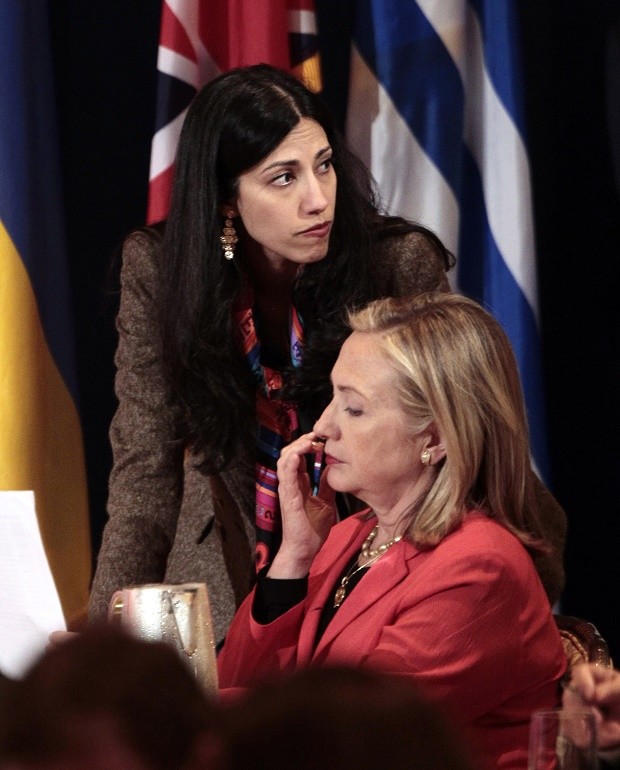Aide: Clinton opposed private emails accessible to ‘anybody’

In this Sept. 20, 2011 file photo, Huma Abedin, top, deputy chief of staff and aide to Secretary of State Hillary Rodham Clinton, right, during a meeting with leaders for the Open Government Partnership in New York. A longtime Hillary Clinton aide Abedin said in a legal proceeding that Clinton did not want the State Department emails that she sent and received on her private computer server to be accessible to “anybody,” according to transcripts released Wednesday, June 29, 2016. Her comments provided new insights into the highly unusual decision by the presumptive Democratic presidential candidate to operate a private email server in her basement to conduct government business as secretary of state. AP FILE PHOTO
WASHINGTON — Longtime Hillary Clinton aide Huma Abedin said in a legal proceeding that Clinton did not want the private emails that she mixed in with State Department emails on her private computer server to be accessible to “anybody,” according to transcripts released Wednesday.
Abedin’s comments provided new insight into the highly unusual decision by the presumptive Democratic presidential candidate to operate a private email server in her basement to conduct government business when she served as secretary of state.
Abedin also said under oath that she was not aware whether Clinton personally deleted any emails during her tenure as secretary.
Abedin told lawyers for the conservative group Judicial Watch in a deposition that she could not recall whether she or Clinton discussed with any State Department officials Clinton’s use of her server exclusively for government business. Abedin was Clinton’s deputy chief of staff at the State Department, now works with Clinton’s presidential campaign and often travels with the candidate. Abedin used an email account on Clinton’s server occasionally for government business, although Abedin also used a government address.
“I assumed it was OK to do,” she testified.
Article continues after this advertisementAbedin is one of several former State Department officials who are being deposed by the conservative group in a civil lawsuit over the agency’s failure to turn over files under the Freedom of Information Act. A transcript of the proceeding was released by Judicial Watch on Wednesday.
Article continues after this advertisementREAD: More Clinton emails released, including some she deleted
Judicial Watch lawyers repeatedly pressed Abedin to explain Clinton’s concern expressed to her in a November 2010 message that her emails might become public, but the longtime aide insisted that Clinton’s interest in wanting to keep her personal correspondence from being exposed was similar to any private citizen’s.
“I would imagine anybody who has personal email doesn’t want that personal email to be read by anybody else,” Abedin explained. “I read it the same way as she has written it.”
But Clinton’s private server contained tens of thousands of work-related emails as well as private messages, and her decision to conduct both private and government business on her system meant that she kept control of both types of correspondence, effectively preventing her State Department correspondence from being archived by the agency and made available for public records requests. It was not until late 2014 — more than a year after Clinton left office — that the State Department learned that she held all of her email and requested that she turn over all work-related records.
Clinton turned over nearly 33,000 business-related messages while disposing of about the same number of personal messages. But Clinton failed to turn over at least three dozen work-related emails, according to the agency. Among those emails was a November 2010 email exchange with Abedin discussing her concerns about the risk of the “personal being accessible.”
The Clinton campaign Wednesday criticized Judicial Watch for its role in filing several lawsuits against the State Department, among more than 30 filed by conservative legal groups and media outlets, including The Associated Press, to obtain Clinton documents. Clinton campaign spokesman Nick Merrill said Judicial Watch’s lawsuits end up “clogging up the courts at the expense of tens of millions of taxpayer dollars.”
Abedin’s deposition also raised questions about the State Department’s practices responding to government records requests under the US Freedom of Information Act. Abedin, a senior aide during Clinton’s entire tenure there, testified under oath that she never searched or was asked to search for documents in her State Department or her private Clinton email accounts in response to requests or lawsuits under the open records law.
But a review of all requests to the State Department during that period found several asking specifically for copies of Abedin’s emails on a variety of subjects, including her husband, one-time disgraced Rep. Anthony Weiner.
“Did you ever search, were you ever asked to search your state.gov e-mail account in response to a FOIA request or FOIA litigation?” lawyer Ramona Cocta asked.
“I believe I said ‘no,'” Abedin answered.
“Were you ever asked to search your Clinton email.com account during your tenure at the State Department in response to a FOIA request or FOIA litigation?” Cocta asked.
“No, I was not,” Abedin said.
It was not immediately clear how the State Department could have complied with such legal requests for Abedin’s emails without asking Abedin to search her messages. Some federal agencies permit full-time FOIA staffers to search the inboxes of senior government officials, but many agencies expect officials to search their own accounts and no US employee presumably would have had access to Abedin’s personal account on Clinton’s private server. Abedin said she was not aware that anyone else searched her accounts, either.